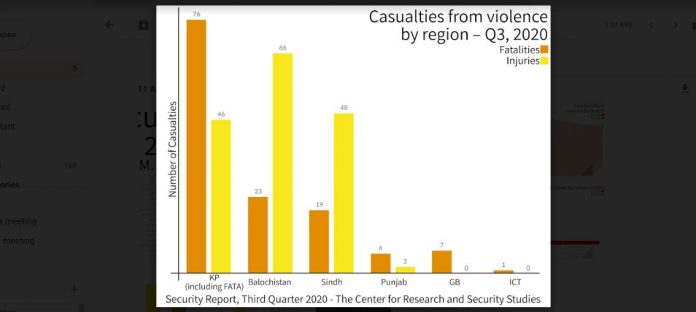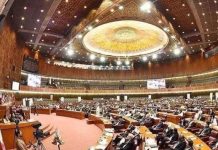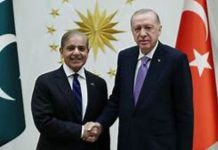DNA
ISLAMABAD, OCT 7 – A total of 132 fatalities from violence were recorded during the third quarter of 2020 with 162 people injured. Nearly 58% of the total fatalities were recorded in Khyber Pukhtunkhwa (KP) (including former FATA), while Balochistan had the next highest number of fatalities (23), followed by Sindh (19), Gilgit Baltistan (GB) (7), Punjab (6), and Islamabad Capital Territory (ICT) (1). While Punjab and Islamabad appeared to be the least affected by violence, KP, and Balochistan were the worst affected regions of the country.
This is according to the third quarter 2020 security report issued by the Center for Research and Security Studies (CRSS) in Islamabad today.
A marginal drop in violence (5%) was observed during this quarter, but the number of wounded persons was higher this quarter compared to the previous one (162 in Q3 versus 46 in Q2, an increase of over 350%).
North Waziristan and Karachi remained atop the list of districts in terms of fatalities from violence. South Waziristan, Killa Abdullah, Nowshera, Rajanpur, and Awaran experienced a sudden uptick in fatalities from violence. All provincial capital cities except Lahore, the provincial capital of Punjab, remained relatively peaceful for both quarters in a row.
Civilians were the largest group affected by violence and counter-violence this quarter, a nearly 45% increase over the last quarter from 36 to 59. Security personnel remained the main target of militant attacks during this quarter with 42 fatalities, showing no major drop when compared with last quarter’s figure of 43. As compared to civilian and security personnel’s fatalities, militants and insurgents witnessed a significant drop in their fatalities during this quarter.
KP and Sindh had major incidents of sectarian violence during this quarter while Balochistan and Punjab experienced very few incidents (table 09). It was also quite alarming to see hate-filled sectarian rallies in the largest city of the country (Karachi), as well as the federal capital, a few miles from the parliament.
The report is authored by Muhammad Nafees, Senior Research Fellow for CRSS.

















